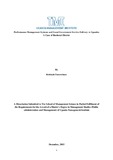| dc.contributor.author | Tumwebaze, Robinah | |
| dc.date.accessioned | 2019-10-15T14:27:21Z | |
| dc.date.available | 2019-10-15T14:27:21Z | |
| dc.date.issued | 2015-12 | |
| dc.identifier.citation | Tumwebaze, Robinah (2015) Performance Management Systems and Local Government Service Delivery in Uganda: A Case of Bushenyi District | en_US |
| dc.identifier.uri | https://hdl.handle.net/20.500.12305/751 | |
| dc.description.abstract | The study was aimed at examining the relationship between performance management systems and local government service delivery in Uganda; a case of Bushenyi district local government. The overall objective of this study was to examine the relationship between performance management systems and local government service delivery in Bushenyi local government. The study objectives included; establishing the relationship between setting performance objectives and local government service delivery, establishing the effect of performance measurement on local government service delivery and assessing the impact of performance feedback and reward on local government service delivery all in Bushenyi local government. The study was largely guided by motivational theories notably by Locke’s goal setting theory and Vroom’s expectancy theory. The study used triangulation that is; cross sectional and case study research design was adopted supported by both qualitative and quantitative approaches. Data was gathered from a sample size of 169 respondents on the basis of probability and non-probability sampling strategy. Data was collected using selfadministered questionnaires and interviews for key respondents. Qualitative data was analyzed using both thematic and content analysis while quantitative data was analyzed using statistical analysis notably correlation and regression analysis. Results indicate that the two hypotheses that guided the study; performance measurement (.364*) and performance feedback and reward (.435*) which had a greater relationship to local government service delivery were accepted. While setting performance objectives which did not have a statistically significant relationship to LGSD was rejected. It was concluded that employers should set SMART performance objectives, monitor and regularly assess them, provide constructive feedback and also effectively reward employees. | en_US |
| dc.language.iso | en | en_US |
| dc.publisher | Uganda Management Institute | en_US |
| dc.subject | Performance Management Systems | en_US |
| dc.subject | Local Government Service Delivery | en_US |
| dc.subject | Uganda | en_US |
| dc.title | Performance management systems and local government service delivery in Uganda: A Case of Bushenyi District | en_US |
| dc.type | Thesis | en_US |

